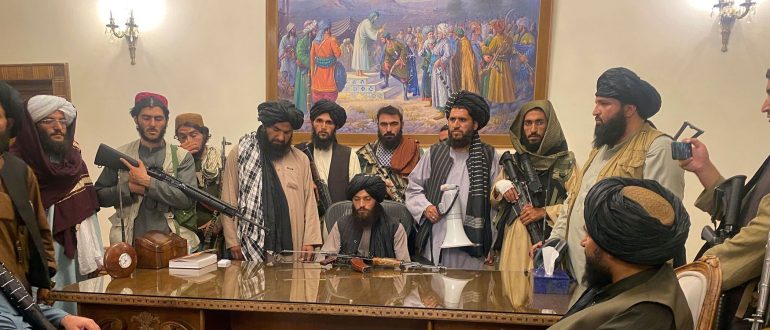
The Future of India’s Relationship with Afghanistan after the Rise of the Taliban
In the ever-changing terrain of geopolitics in South Asia, an old player has re-emerged. In Afghanistan, in a mere twenty days after the withdrawal of the U.S. troops, the Taliban seized power. Despite resistance, the Islamic fundamentalist group grows stronger as time passes. The coming of this new regime puts into question the maintenance of the growing Indo-Afghan relations. It remains to be seen whether the Taliban’s rule halts cooperation between the two countries, or whether it leads to the emergence of a constrained friendship and adds to the growing tensions in the region.
Despite cultural ties that go back centuries (Rey M., 2021), and notwithstanding recently growing cooperation, India has had a tumultuous and fickle diplomatic relationship with Afghanistan. The primary reason for this is the constant fluctuations (Thier A. & Woodern S., 2017) in Afghanistan’s Indo-Pakistani policy which stems from unstable political dynamics of the country. Historically, Taliban rule in Afghanistan has led to a tilt towards Pakistan in diplomatic relationships and has had a negative impact on Indo-Afghan cooperation. (Subramanian N., 2021) Additionally, the Taliban have received clandestine support from Islamabad for years. (NSA, 2007)
However, Afghanistan is an essential transit hub between South Asia and Central Asia, and thus has the potential to play a pivotal role in the development and economic prosperity of the region. (Akhlaqi S., 2017) India has been involved in several projects as well as aid and reconstruction programs to exploit this potential. Yet, most of these assistance programs have taken place during the reign of non-fundamentalist, mostly democratically elected governments. In a massive policy change, India has only recently taken initiative to establish diplomatic relationships with the Taliban.
This time around, the Taliban have proven to be more strategically organized, yet, the immediate impact of the establishment of the “Islamic Emirate of Afghanistan” is far from positive. Even though the Taliban have declared interests in establishing cordial relations with New Delhi, new Indo-Afghan relations under Taliban rule are unlikely. The induction of the Haqqani group into the Taliban government has already made matters worse to the Indian government and maintains strong ties with Pakistan’s ISI (Miller M., 2017) and, in the past, was involved in several attacks on Indian assets in Afghanistan. Additionally, the Taliban have begun to contradict several of the promises made publicly, which it seems, were only made for the projection of a positive image of the group. No significant steps have been taken by the newly inducted government to make good of its declaration of “cordiality”. Furthermore, the takeover of Taliban increases the risk of indoctrination and violence in the unstable regions of Kashmir. (Wani A., 2021) Despite promises to the contrary, Taliban led Afghanistan could quickly become a breeding ground for other terrorist groups.
When it comes to India’s assets in Afghanistan, the effect on them would depend on the quality of the relations established between the governments of the two countries. On the face of it, the chance of establishing a sustainable cooperative relationship seems bleak due to the inherent nature of Taliban as well as its closeness to Pakistan. It must also be kept in mind that the Chinese government, despite the ideological differences, has been quick to offer assistance to the Taliban. Moreover, it is backing the Taliban’s demand from the U.S. to unfreeze Afghanistan’s assets. India should not overlook these growing trilateral relations between Afghanistan, Pakistan and China which would definitely pose a problem for India in the long-run. While Pakistan and China are already “all-weather” allies (Sattat H., 2015), the addition of the Taliban led Afghanistan to this partnership would result in increased trade as well as border related insecurities to India.
It is evident that, when it comes to Afghanistan, India’s “Neighbourhood First” policy is failing. The country’s bid to strengthen Indo-Afghan relations and bring stability to the region through investing in Afghanistan has been distressed due to the sudden and rapid takeover by the Taliban. However, India cannot afford to lose Afghanistan as a strategic ally. At the same time, it cannot ignore the human rights violations occurring in Afghanistan. It remains be seen whether India undertakes humanitarian interventions in Afghanistan. On the other hand, keeping in mind the rapid changes occurring in Afghanistan, the Indian government needs to take swift action. Engaging in a bilateral dialogue to negotiate a common ground is what will best serve the needs of the hour. The Indian government needs to keep an eye on the trajectory of Afghanistan’s relationship with Pakistan and China while proactively reconfiguring its own. It must be remembered that while Taliban leaders have said that the group wants to maintain its ties with India, eventually, Sino-Pakistani influence will definitely bring changes to this position. Hence, the Indian government will need to work towards restrictions of anti-Indian sentiments in Afghanistan that could very well have a detrimental effect on domestic political sovereignty (Lee M., 2018). Nevertheless, Afghanistan cannot survive on Sino-Pakistan support alone and at one point or another, the Taliban will even more on India’s support to maintain legitimacy of their rule.
Youssef N. and Lubold G (2021). Last U.S. Troops Leave Afghanistan After Nearly 20 Years, Wall Street Journal. Accessed 13 September 2021.
British Broadcasting Corporation (2021). Afghanistan: Don’t recognise Taliban regime, resistance urges, Accessed: 13 September 2021.
Embassy of India, Kabul. Indo-Afghan Relations. Accessed 13 September 2021.
Rey M. (2021). Afghanistan’s history and its connections with India, The Daily Guardian. Accessed 15 September 2021.
Khalil A. (2016). The Tangled History of the Afghanistan-India-Pakistan Triangle, The Diplomat. Accessed: 16 September 2021.
Thier A. and Wodern S. (2017). Special Report 408, United States Institute of Peace. Accessed: 16 September 2021
Subramanian N. (2021). Explained: A look at Pakistan’s long relationship with the Taliban, The Indian Express. Accessed: 16 September 2021.
The National Security Archive (2007). Pakistan: “The Taliban’s Godfather”?, 14 August 2017.
Akhlaqi S. (2017). Afghanistan: Transit hub for the region, The Economic Times, Accessed: 16 September 2021.
Iwanek K. (2019). 36 Things India Has Done for Afghanistan, The Diplomat, Accessed: 16 September 2021.
Vaid D. (2021). India announces first diplomatic contact with the Taliban, Deutsche Welle. Accessed: 19 September 2021.
Miller M. (2021). Pakistan’s Support for the Taliban: What to Know, Council on Foreign Relations. Accessed 19 September 2021.
Mohanty K. (2021). Explained: Al-Qaeda Ties, Attack On Indian Assets. Why Haqqani Network In Taliban Is Driving Worries, News18. Accessed: 17 September 2021.
Dawn (2021). Taliban pardon rivals, vow to honour women, 18 August 2021. Accessed: 17 September 2021.
Farge E. (2021). Taliban breaking promises including over women, says U.N., Reuters. Accessed: 18 September 2021
Wani A. (2021). Resurgent Taliban and its implications on Kashmir, Observer Research Foundation. Accessed: 20 September 2021.
Chaturvedi A. (2021). ‘Pakistan our second home, there is peace in Afghanistan’: Taliban spokesperson, Hindustan Times. Accessed: 16 September 2021.
British Broadcasting Corporation (2021), China offers $31m in emergency aid to Afghanistan, 9 September 2021. Accessed 16 September 2021.
Business Standard (2021). China backs Taliban’s demand to US to unfreeze Afghanistan’s assets, 15 September 2021. Accessed: 20 September 2021.
Sattar H. (2015). China and Pakistan’s All-Weather Friendship, The Diplomat. Accessed: 14 September 2021.
Statement by Michelle Bachelet, UN High Commissioner for Human Rights, 31st Special Session of the Human Rights Council The serious human rights concerns and situation in Afghanistan, 24 August 2021. Accessed: 19 September 2021.
Lee, M. (2018). The International Politics of Incomplete Sovereignty: How Hostile Neighbors Weaken the State, International Organization, Vol. 72 No. 2, pp. 283-315. Accessed: 20 September 2021

